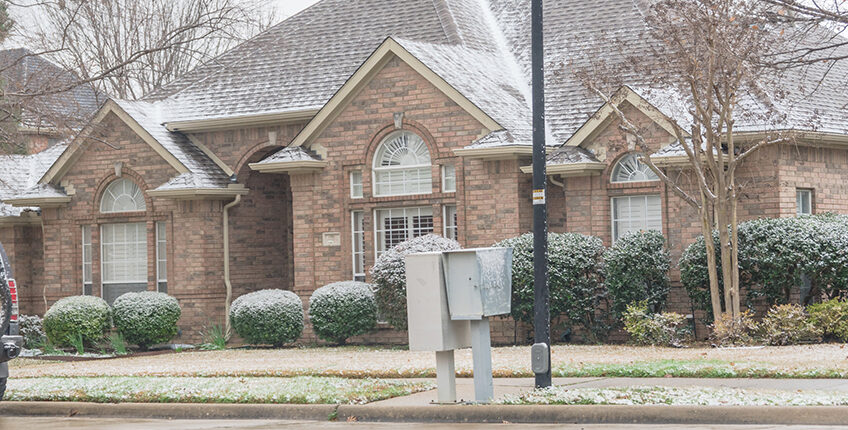
As residents of Colorado’s western slope, we’re no strangers to extreme winter weather and the impact it can have on daily life. Some conditions, such as high winds, heavy rain, snow, or ice, don’t just affect road driving and heating bills, they can also disable your security and alarm system.
In order for your system to continue working properly, year-round local weather factors should be taken into account and owners should be aware of what’s affected. Blizzards and frigid subzero temperatures can handicap your home’s system, if it wasn’t formatted to withstand those conditions.
Many business and estate owners may wonder which aspects of their systems will stand up best. To keep Mother Nature from having a negative impact on your system, and continue to protect you, your family and your property, here are 3 factors to keep in mind and how to prepare for each:
1. No Electrical Power
All systems need a power source, which will supply the panel and all the security and alarm devices wired to the panel. Most systems operate on electricity, which you may not have throughout the duration of the storm and possibly for days afterward.
When the storm dies down, eventually power will be restored. But if there’s significant damage to the power grid, it may take additional time to repair. In other words, just because the storm is over, doesn’t necessarily mean power is restored right away.
Unfortunately, some criminals will see a power outage as a sign of opportunity, when they can commit crimes under the cover of darkness, when victims are confused or distracted. Therefore, backup systems are necessary.
When battery backup power is available, the system should automatically switch over to battery power until electricity is restored. Contact Intermountain Systems to ask if you’d like to know how long your battery will last. Once electric power is restored, the system will switch back, and the battery will begin recharging. Under normal circumstances, the control panel will test the backup battery periodically to make sure it’s functioning properly, and if not, notify or alert you.
2. Disabled Alarm Communications
Every alarm panel has its own unique method of communicating with central monitoring stations. Communication methods include:
- Regular old telephone landlines, also known as POTS ( Plain Old Telephone System)
- VoIP or Voice over Internet Protocol which is basically a digital phone that transmits alarm signals through the internet
- Cellular uses cellular technology, including cellular towers and cellular communications equipment
Each of these methods has its own advantages and disadvantages. Landlines are slowly being phased and the 3G sunset is upon us, which will affect Cellular systems. VoIP needs power to work, even with a battery or generator power back-up, it can only provide up to about 8 hours of standby.
Alarm systems can have multiple communications systems in place as a double-redundancy.
For example, having VoIP with a Cellular backup.
It’s critical that you keep Intermountain Systems updated if you make any changes to your regular telephone landline services.
3. Unreachable Emergency Services
Whether you’re in Steamboat Springs, Aspen or Breckenridge, if there’s Weather Channel worthy coverage of our local area, chances are likely, you can also expect delays with emergency services.
Emergency department telephone lines will be busy. When this happens, departments have policies and protocols to triage emergencies based on severity and resources available.
There are proactive steps you can take to increase your protection status.
Always keep your alarm notification call lists updated. Feel free to contact Intermountain Systems anytime, you can even stop reading this right now and call, to verify the information we have on file for you or to make changes. And if you change any information, such as getting a new smartphone or changing phone numbers, please remember to notify Intermountain Systems.
During an emergency, if you need police, fire or medical services, it’s important we know who to notify. In the event of an active alarm, it’s important that we know who to notify and in what order, so we can get you the police, fire or medical emergency help you need at the right time and place.
It’s also recommended that you add additional members to your notification call list. This can include family living outside your home, trusted neighbors or local friends. Adding any of these will give the central station a 2nd line of defense to verify an active alarm and confirm the need for emergency personnel to respond.
Additionally, another way you can prepare yourself in the case of unreachable emergency services is to have an emergency prepared and ready to keep you safe until help arrives. Some recommendations on what the kit should include are:
- Blankets, jackets and other warm layers
- Water, nonperishable food
- Flashlights, matches or firestarter, firewood, kindling, etc.
- A radio that’s battery-powered and/or hand-crank to receive updates on the storm, power restoration, news, etc.
- A noisemaker such as a whistle
- Backup power, a Generator, either gas-powered or electric battery pack, or solar charger
- Snow shovels
Keep all doors and windows locked until help arrives and be cautious of strangers offering help.
Natural disasters and inclement weather can wreak havoc on your system and render it incapable of protecting your most important assets —YOU!
Intermountain Systems
A UL-certified alarm monitoring company, has provided luxury Residential & Commercial Security for the Colorado Western Slope community since 1981. Installing and Integrating Complete Systems, from Entertainment to Automation all the way to full Security with Fire and Life safety.






